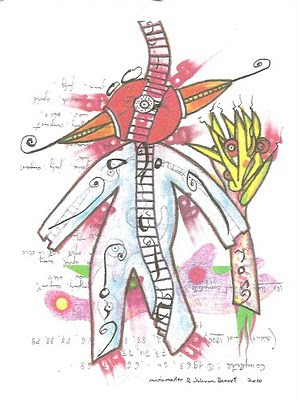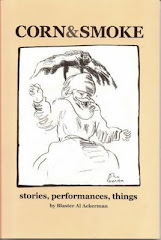Reading someone's "Top 20 Horror Writers Of All Time" list online that left off my favorite, Robert Aickman, completely inspired me to post this old piece I did for The City Paper a while back when I had hair. Aickman is one of a kind, in my top ten of any kind of writers.
Somewhere in the Back of Beyond
The Sublimely Strange Stories of Robert Aickman
Chuck Shacochis
Imprints Literary Supplement 1999
The only players in "Your Tiny Hand Is Frozen," one of Robert Aickman's most chilling short stories (included in
The Wine-Dark Sea, a posthumously published collection of his writings), are a lonely translator named Edmund, a humming telephone, and an oafish intruder named Toby. There is no squirting, squelching blood or exploding body parts, and the action never leaves its studio-apartment setting until the story's last page. Still, this is one of the most disquieting tales ever written, a story of the disintegration of a mind that begins with Edmund hearing "a rather high pitched gabbling" on the telephone. "It occurred to him even that the sounds might not be vocal, but might come from the telephone system itself."
Critics often compare Robert Aickman to M.R. James and Walter de le Mare, two authors of classic ghost stories, but his work also fits well spiritually with that of Franz Kafka and Samuel Beckett, writers who depict the agony of human communication in a mechanized world. As Paul Kincaid wrote in a review of Aickman's Night Voices: Strange Stories in British Book News: "He writes a precise and elegant prose, full of sharp perceptions of the ordinary, so sharp that a niggling sense of unease slowly develops without anything out of the ordinary actually happening." Most of Aickman's horror is of a clean, well-lighted madness, made all the more painful by the perceptive characters' awareness of their psychological descent.
Robert Fordyce Aickman was born in 1914 in London and died in 1981. He was the son of an architect, whom he described in his autobiography, The Attempted Rescue, as "the oddest man I have ever known"; his maternal grandfather was the noted Victorian novelist Richard Marsh. Starting in the mid '60s, Aickman produced 11 short-story collections, two novels, the autobiography, and two books on England's waterways. He founded the Inland Waterways Association in 1946 and is widely credited with saving the British canal system for future generations. He was also a drama critic for the British magazine Nineteenth Century and After and a film critic for another periodical, Jewish Monthly.
His strengths as a writer of self-aware horror are evident in one of his signature pieces, "Never Visit Venice." The tale depicts an introverted man nearing 40 named Henry Fern, who has reached the point in his life where he "simultaneously matured and withered." All his life he has felt "something in him which made him different from most of the people he encountered in the office or in the train or in the park or at the houses of others. He could not succeed in defining what this difference was, and he simultaneously congratulated and despised himself for having it." For many years Fern glides through his gray office-worker existence with only a recurring dream of riding in a gondola with a beautiful woman in Venice to console him. When this dream stops occurring "its place was taken in the back and at the edges of Fern's mind by the sentiment of death. . . . It was a soft-footed, never-absent familiar."
With omnipresent thoughts of death prodding him and a promotion at work making it financially possible, Fern decides to visit Venice and make peace with himself. Once there, the reality of modern Venice crushes him. "Venice was rotted with the world's new littleness. To many her beauty was actually antagonistic, as imposing upon them a demand to which they were unable to rise. Soon the Lagoon would be "reclaimed' and the Venetian dream submitted to a new law of values; a puritan law antithetical to the law of pleasure that had prevailed there for so long."
Depressed and making no friends with fellow travellers ("sentimental, self-satisfied philistines," he calls them), Fern decides to go back home early after a perfunctory ride on the city's famous gondolas. He meets a woman in a hooded black cloak who tells him, "The city of Venice would like to invite you for a gondola trip." Believing she works with some sort of tourist agency, Fern goes along with her on a gondola ride. They quickly hit it off and trade mawkish romanticisms, including calling each other Tristan and Isolde. At one point the strange cloaked woman tells him, "Venice is everyone's dream. Venice is a dream."
"With no reality?"
"The reality is what you call a nightmare."
Their gondola glides further and further from the city, paddled by "the gondolier, with strokes as strong and regular as if he were swinging a scythe." As they approach the Porto di Lido, "that notorious wilderness of pleasure," they make love and Fern believes "he was proving himself right and the rest of the world wrong." When Fern awakens from his postcoital nap, he discovers the small craft is drifting at sea; the mysterious gondolier has disappeared. When he reaches for his beloved he finds that she is only a skeleton inside a cloak. "And now there was only the Lido breakwater and, afterwards, the turbulent, nocturnal Adriatic. The gondola sped on like a black leaf on a millstream."
This is classic Aickman. An aging protagonist who feels alien in a world grown flat encounters an apparition or a different dimension. It seems at first to be paradise, but he is ultimately received into nature through death.
A similar trajectory drives the story "The Stains" (from The Wine-Dark Sea), in which Stephen, a recently widowed man, goes to visit his brother in the country in search of emotional succor. During a walk, Stephen encounters Nell, a young woman gathering moss and lichens for her father. She seems to know little of civilization and Stephen considers her "a part of nature . . . perhaps because she lived without contamination, merging into the aspect and mutability of remote places." The two make pleasant small talk and plan to meet again the next day. In no time they feel a mutual bond and Stephen realizes that "[f]or so long he had been isolated, insulated, incarcerated." They decide to set up house together in one of the old, abandoned stone houses they see in their wanderings. During their first act of love Stephen notices a "curious, brownish, greyish, bluish, irregular mark or patch" on Nell's skin. Soon similar patches start forming on the walls of their house and then on the walls of Stephen's apartment, where the couple briefly returns to set his affairs in order. When Stephen goes swimming, a co-worker points out something on his back, "rather like the sort of thing you occasionally see on trees."
When they return to their house in the wild Stephen's hands are covered with "horrid subfusc smears" and at night "the eyes that were watching from behind the marks on the walls and ceiling and utensils glinted back at him, one and all." The couple's love has taken on the mutually beneficial relationship of a fungus and an algae—the fundamental description of a lichen, which Nell was collecting for her father.
The story ends abruptly when they hear a snuffling, wolflike creature outside their house which they suspect to be Nell's supernatural father. They descend into the basement to hide, and the perspective of the story changes. We learn that Stephen's body was found at the verge of a small, lustrous pool, one of the first places he and Nell had visited together. It's left unclear whether the whole story was a hallucination, a nightmare, or a tale of love too great for this earth.
Aickman received only one literary prize in his lifetime, the World Fantasy Award in 1978; it was for his only vampire story, "Pages From a Young Girl's Journal." Like his two novels, The Late Breakfasters and The Model, "Pages" is lighter in tone and more humorous than his main body of stories. A tale of vampirism as the ultimate adolescent rebellion, it should find an audience today among the many fans of Buffy the Vampire Slayer, although "Pages" takes place in the time and hometown of Lord Byron, the legendary poet who arouses in the story's teenage heroine the same adoration bestowed on today's rock stars.
Aickman referred to his work as "strange stories" and considered ghosts to be "creatures we once knew . . . things within us which we have, as psychologists say, projected outside us." In his introduction to the anthology
The Fontana Book of Great Ghost Stories, he wrote, "The ghost story hints to us that there is a world elsewhere." Aickman's own approach to the form was summarized by Peter Straum in his introduction to
The Wine-Dark Sea: "What attracted Aickman to ghosts was not the notion of dripping revenants but the feeling—composed in part of mystery, fear, stifled eroticism, hopelessness, nostalgia and the almost violent freedom granted by a suspension of rational rules—which they evoked in him."




























